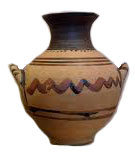
Submycenaean octopus jar from Dark Age Greece
Dark Age isolation and poverty
After most of the Mycenaean palaces were destroyed around 1200 BC, nobody rebuilt them. The only palace we know of which was not destroyed was the one at Athens. But even Athens seems to have had a hard time for the next several hundred years.
Mycenaeans
Athens in the Dark Age
Dark Age timeline
All our ancient Greece articles
There were no more kings. Nobody collected taxes. Nobody repaired the roads, and the roads gradually became full of holes and you could only use them for walking or riding donkeys, not for wagons.
History of donkeys
How did taxes work?
Why did they need gold?
Maybe a lot of people died, because there don’t seem to have been very many people living in Greece at this time. And the people who were still there were poor, and had no gold jewelry in their graves. It even seems that there were no more potters or shoemakers or other craftsmen.
Dark Age Greek pottery
So people mostly had to make their own pots and other things. They didn’t really know how, so the things were very badly made. Without gold, people also stopped sailing to Egypt and Phoenicia to buy things.
Who were the Phoenicians?
Third Intermediate Period Egypt
Dorian invasion
Because Greece was in such bad shape during the Dark Ages, and could not defend herself, it also seems that some of their neighbors to the north invaded Greece and began living in some of the Greek cities.
Illyrians north of Greece
The Greeks called these invaders the Dorians (DOR-ee-uns), and called the old Mycenaean, Bronze Age Greeks the Ionians (i-OWN-ee-uns).
Greek refugees move to Ionia and Israel
A lot of the Ionians fled from the invaders, or just from the bad times in Greece, and moved to other places during the Dark Ages. Many of them moved to the coast of Turkey, and people began to call that place Ionia because of all the Ionians living there.
The Scythians
The Philistines
David and Goliath
Others moved to the coast of the Black Sea, near the Scythians. Some Greeks, or people like them, moved to Israel, where the Jews called them the Philistines (that’s the giant Goliath).
Iron age begins
But some good things also happened during this time. Knowledge of how to make tools and weapons out of iron spread from the Hittites around the Mediterranean Sea, and so the Greeks also learned how to work iron. Iron is stronger than bronze and cheaper to get, because you can mine it in Greece itself instead of bringing tin from far away.
Iron and blacksmithing
Invention of the bellows
Who were the Hittites?
Because iron was cheaper than bronze, more people could use it, even poor people. And without the kings and the palaces, people were generally more equal. The rich people weren’t as rich, so the differences between people weren’t so big. More people owned their own land, instead of being slaves or sharecroppers.
Learn by doing: Does it seem funny for the Greeks to also be the Philistines? Why?
More about the Archaic period
More about the Philistines
Bibliography and further reading about Dark Age Greece:
The Art and Culture of Early Greece, 1100-480 B.C., by Jeff Hurwit (1988).
Early Greece, by Oswyn Murray (second edition 1993).
The Dark Age of Greece: An Archeological Survey of the Eleventh to the Eighth Centuries B.C., by Anthony Snodgrass (2000). Snodgrass thinks that an increase in population caused most of the changes of the Archaic period.
Warriors into Traders: The Power of the Market in Early Greece, by David Tandy (2001). More controversial; Tandy argues that Greek colonies were founded by traders, not because there were too many people living in Greece.
Citadel to City-State: The Transformation of Greece, 1200-700 B.C.E, by Carol G. Thomas and Craig Conant (2003). Argues that the Dark Ages were actually an exciting time of new developments.
The Greeks Overseas: The Early Colonies and Trade, by John Boardman (2nd edition 1999).